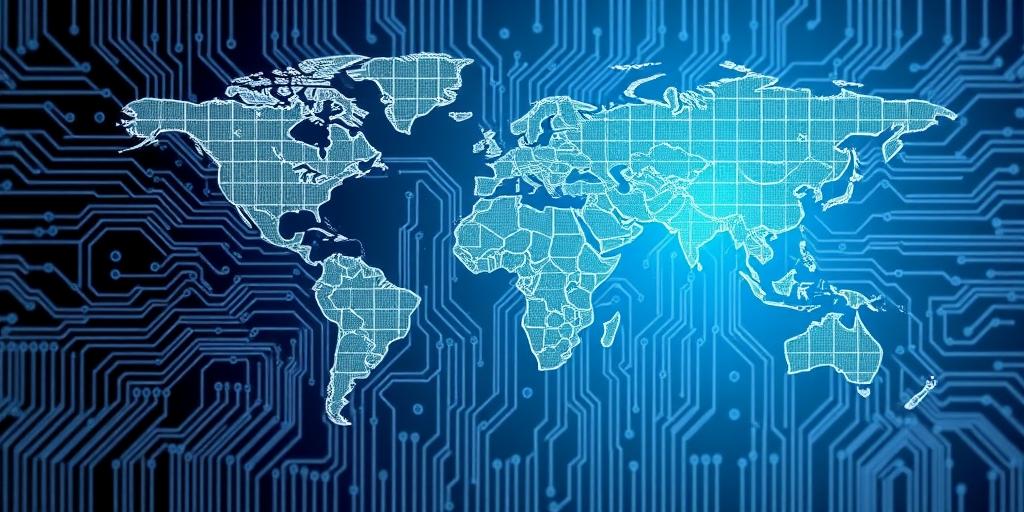Deep Dive Examining the Geopolitics of Technology
In an era defined by rapid technological advancement, the intersection of technology and geopolitics has become increasingly critical. This deep dive examines the multifaceted relationship between technology and international relations, exploring how technological innovation shapes geopolitical power dynamics and influences global strategies.
The Rise of Techno-Nationalism
Techno-nationalism, the belief that national economic prosperity and security are dependent on technological leadership, is on the rise. Nations are investing heavily in strategic technologies like artificial intelligence (AI), quantum computing, and biotechnology to gain a competitive edge. This pursuit of technological supremacy is reshaping alliances and creating new spheres of influence.
- AI Dominance: Countries are vying for leadership in AI, recognizing its potential to transform industries, military capabilities, and economic growth.
- Quantum Race: Quantum computing promises to revolutionize cryptography, materials science, and more, making it a high-stakes arena for national investment.
- Biotech Competition: Advances in biotechnology are driving innovation in healthcare, agriculture, and defense, leading to intense competition among nations.
Technology as a Tool of Geopolitical Influence
Technology is not merely a driver of economic growth; it has also become a powerful instrument of geopolitical influence. Nations are leveraging technology to project power, exert control, and advance their strategic interests.
- Cyber Warfare: Cyberattacks have become a common tool for espionage, sabotage, and disinformation campaigns. Nations are developing sophisticated cyber capabilities to defend against attacks and project offensive power.
- Digital Surveillance: Surveillance technologies, including facial recognition and data analytics, are being used to monitor populations, suppress dissent, and gather intelligence.
- Internet Governance: Control over internet infrastructure and content is a key battleground in the geopolitical arena. Nations are seeking to shape internet governance to reflect their values and interests.
The Geopolitics of Data
Data has emerged as a critical resource, often referred to as the "new oil." The control and flow of data are central to geopolitical competition, influencing economic competitiveness, national security, and societal values.
- Data Localization: Governments are enacting data localization laws, requiring data to be stored and processed within national borders. These measures are aimed at protecting privacy, enhancing security, and promoting domestic industries.
- Cross-Border Data Flows: The ability to transfer data across borders is essential for international trade and collaboration. However, concerns about privacy, security, and national sovereignty are leading to increased scrutiny of cross-border data flows.
- Data Governance: International cooperation on data governance is essential to address issues such as data privacy, security, and access. However, differing values and priorities among nations make it challenging to reach consensus.
The Role of Technology Companies
Technology companies play a significant role in the geopolitics of technology. These companies are not merely economic actors; they are also strategic assets that can shape geopolitical outcomes.
- National Champions: Governments are supporting and promoting domestic technology companies to compete globally. These national champions are often seen as vital to national security and economic prosperity.
- Regulatory Scrutiny: Technology companies are facing increased regulatory scrutiny from governments around the world. Antitrust enforcement, data privacy regulations, and content moderation policies are shaping the behavior of these companies.
- Geopolitical Risks: Technology companies face geopolitical risks, including trade wars, sanctions, and cyberattacks. These risks can disrupt operations, damage reputations, and undermine competitiveness.
Navigating the Geopolitical Landscape
As technology continues to reshape the geopolitical landscape, it is essential to understand the complex interplay between technology and international relations. Nations, companies, and individuals must navigate this landscape strategically to mitigate risks and seize opportunities.
- International Cooperation: International cooperation is essential to address shared challenges such as cyber security, data governance, and technology standards. Multilateral forums and agreements can help foster trust and promote common interests.
- Strategic Investments: Nations must invest in strategic technologies and infrastructure to maintain competitiveness and protect national security. Public-private partnerships can help accelerate innovation and deployment.
- Ethical Considerations: Ethical considerations must be at the forefront of technology development and deployment. Ensuring that technology is used responsibly and ethically is essential for building trust and promoting social good.
In conclusion, the geopolitics of technology is a complex and evolving field that requires careful analysis and strategic decision-making. By understanding the interplay between technology and international relations, nations, companies, and individuals can navigate this landscape effectively and contribute to a more secure and prosperous future.









